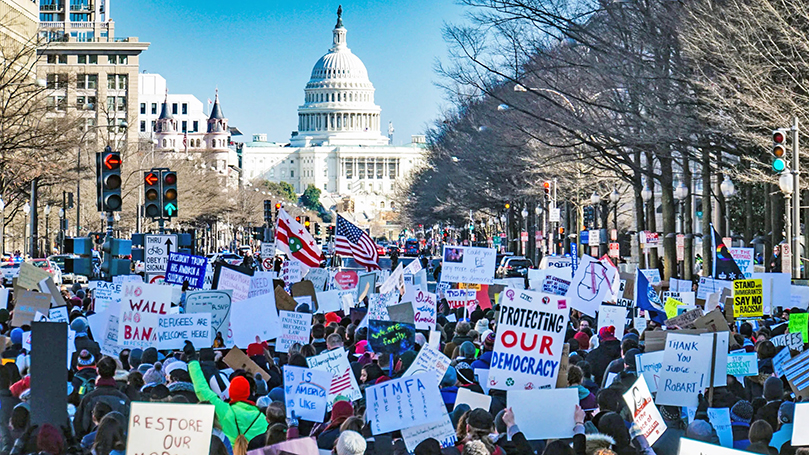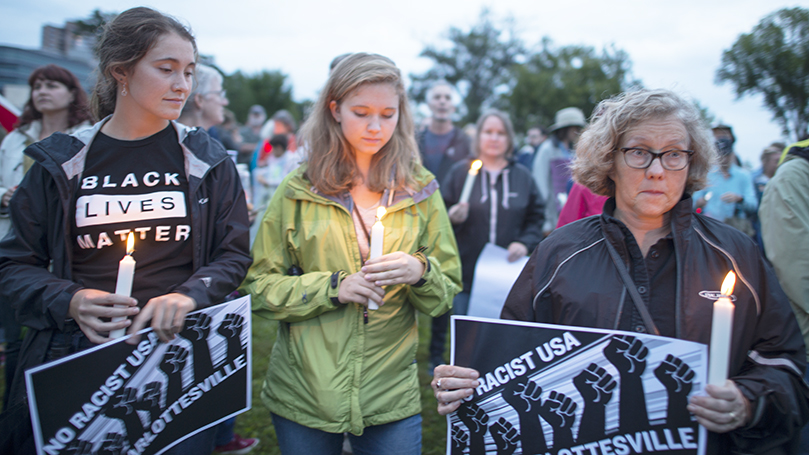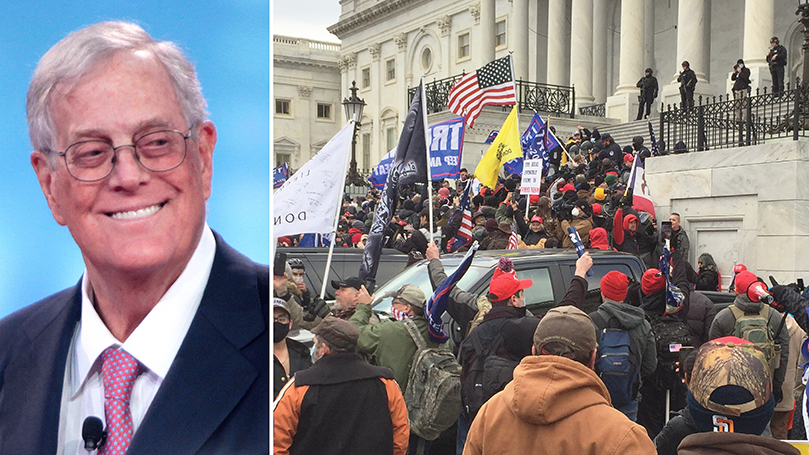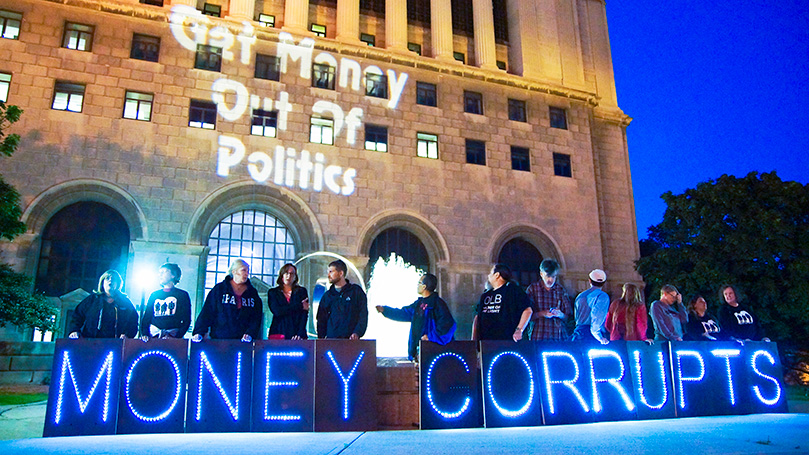
The fascist form of capitalist rule is never immediately imposed, but is gradually insinuated into daily life, growing in force, power, and violence until the forces behind it secure state power. Fascists fight to normalize assaults on democracy, democratic institutions, socialistic and radical movements, and even liberal democratic forces. Above all, their violence is directed against people and communities who have won a right to exist and to sometimes thrive through democratic protections. The fascistic impulse to normalize violence and hate has been thrust into the foreground of U.S. society for more than a decade.
 To secure power, fascists target democratic institutions for elimination. As this is being done, liberal democratic forces work to continue to sustain a belief in the neutrality of those institutions as an abstract process, operating independently from its real-life context. The fascist goal is to absolutely destroy any beliefs in institutions and processes in order to create a perceived need for a dictatorial individual or party to rule in their place. As George Dimitrov argued, “By destroying the relics of bourgeois democracy, by elevating open violence to a system of government, fascism shakes democratic illusions and undermines the authority of the law in the eyes of the working people.” While his reference to a positive belief by working class and democratic forces in the “authority of the law” is to a utopian notion of an abstract process, his full statement makes it clear that he was not encouraging a blind belief in the “illusions” of the democratic process with its current class content.
To secure power, fascists target democratic institutions for elimination. As this is being done, liberal democratic forces work to continue to sustain a belief in the neutrality of those institutions as an abstract process, operating independently from its real-life context. The fascist goal is to absolutely destroy any beliefs in institutions and processes in order to create a perceived need for a dictatorial individual or party to rule in their place. As George Dimitrov argued, “By destroying the relics of bourgeois democracy, by elevating open violence to a system of government, fascism shakes democratic illusions and undermines the authority of the law in the eyes of the working people.” While his reference to a positive belief by working class and democratic forces in the “authority of the law” is to a utopian notion of an abstract process, his full statement makes it clear that he was not encouraging a blind belief in the “illusions” of the democratic process with its current class content.
Importance (and limits) of democratic institutions
Where did democratic institutions come from? The capitalist class (under conditions of struggle for leadership with the feudal aristocracy, petty producers, workers, and peasants) at the founding of the capitalistic nation-states created political processes, or constitutions, which held some democratic features. Those constitutions worked as agreed-upon processes for governing, moderating disputes, and resolving crises.
In democratic theory, that process acts as an abstraction to which the various influential entities or corporations or forces surrender power and agree upon the rules of the game and abide by the outcome in advance of playing it. Thus, the process itself is thought of as the source of democratic legitimacy. Accordingly, regular elections are conducted in a systemized way to which society’s members claim to have all agreed and to abide by no matter the outcome, at least for the duration of the cycle. They also agree not to destroy that government in the meantime, but to let it function (even as they may struggle against some of its policies). The process enables the state to appear to operate abstractly and to fairly manage conflict among various social forces and reduce violent conflict and so on.
One of Lenin’s greatest contributions to political theory, in State and Revolution, was to show how such a process under the current system was “the shell” that hid the actual “kernel” of capitalist class power. The main trends in democratic politics are driven and compelled by the capitalists, even if occasionally capitalists are forced to make concessions to the working class and its allies. At the same time, Lenin insisted that elections and parliamentary politics were a crucial site of struggle for workers. Communists fight to defend democracy as the centerpiece of the anti-fascist strategy, but they do not pretend this process has been emptied of its class content.
The idea of a political “process” as an abstraction is good. Even in its current form, it reflects a balance of social forces that allows for an anti-racist, working-class struggle to influence, alter, or even undermine the capitalist-class agenda. Ultimately, such struggles may reshape the balance of forces, improving the overall landscape for the future of the class struggle.
An abstract democratic process under working-class leadership and power will function far more fairly or neutrally, resolving social conflict and crisis in the interest of the overwhelming majority of the people. This idea is also foundational to the “withering away of the state,” coinciding with the abolition of class society. In today’s wording, we do not solely seek a “more perfect union” under existing conditions, but one which is created, led, and managed by the working class and its allies.
Under fascism, dictatorship becomes “open,” as the space for freely struggling social forces closes. Fascists become less concerned about how the repression of democratic institutions appears to the outside world. Indeed, they seek to make repression of non-fascists part of their general, everyday field of action. They boast about “owning the libs” or causing people to be “offended” or “triggered” with violent rhetoric, conspiratorial fabrications, and repressive legislation. Rather than being hidden as a potential political liability, exhibiting vicious intent is embraced as a source of pride.
Our context today
When fascism secures state power, it represents the substitution of bourgeois democracy for the open, terrorist form of class power. This is how we understand the context and aim of the recent decade of political struggle: beginning with the corporate-backed Tea Party’s rise, Trump’s presidency, and what was attempted on Jan. 6, 2021. Since the Trump administration, fascist incursions and armed threats — from the mass demonstration in Charlottesville, to the kidnapping plot in Lansing, Michigan, to racist and homophobic mass killings in Buffalo, El Paso, and Miami, to vigilante killers like Kyle Rittenhouse and Jordan Neely’s killer Daniel Penny — have recurred on a seemingly endless loop. The fascist forces involved here were not just emboldened; Trump unleashed them.

Trump’s call for his followers to stop repressing their hostility toward people of color, women, LGBTQ communities, immigrants, and non-Christians played a significant role. Stop being afraid to offend people, he ordered them. As the philosopher Lewis R. Gordon argues in his book The Fear of Black Consciousness, “white guilt” (and probably other similar states of consciousness among majoritarian racial, gendered, religious, or national identities) is a turning inward of pathological aggression. Trump’s call is meant to turn that aggression outward to target the real object of white hatred, xenophobia, and religious bigotry; it aims to make open racism and poisonous hatred great again.
Recent reporting in the media documents the content of Trump’s plan for claiming massive new powers for the presidency. It is endlessly frustrating to him, as it is for most capitalists who are used to dictating policy in their organizations, to have to confront the democratic process. This isn’t just a Trump pathology; it is common in the capitalist class and the managerial strata. Trump directly states that he would take steps to eliminate democratic obstacles to his personal control over the political process. We should take him at his word; he wants to create the conditions for dictatorial rule. To accomplish this, like his fascist predecessors, he believes the “abstract process” must be eliminated, suppressed, or carefully managed by the fascists who share his totalitarian frame of mind.
To justify the drastic suppression of the democratic process, fascists target the anti-fascist or non-fascist elements as fundamental threats that require new special rules. The ultra-right frequently promotes the assumption that non-white voters are inherently illegitimate, falsely claims that affirmative action policies are “racist,” and regularly spreads the delusion that jobs or social benefits belong first and foremost to Euro-Americans. This racial-religious nationalism is pathological, obsessive, and compulsive, rooted in cognitively dissonant hypocrisy and inconsistency, even to the point of tremendous self-harm — both material and psychological. Their response to COVID exemplifies this fact. Fascists target people who they believe do not belong to a narrow, usually racist, or chauvinist version of the “nation.”
Specific anti-democratic targets
The suppression of voting rights is one main way of lessening the power of people whom fascists would prefer to not exist. (This fact shows how crucial elections are to the democratic struggle, even though no single election likely holds a major transformative significance.) Ideologies that support the suppression of voting rights seep into and poison immigration policy, mass incarceration, and public discourse on sexuality, gender identity, and abortion. Fascist ideologies deny the humanity of refugees and migrants of color, queer folk, transgender individuals, and (in the U.S.) non-Christians. Fascists demand that even the democratic process’ illusory neutral stance be eliminated because it is supposedly exploited by “dangerous” people, to the extent it recognizes the latter’s humanity and affords them legal standing. Many non-fascists waver and capitulate to these demands.
Fascist ideas and policies are turned against the country itself as the fascist’s political opponents are said to be aligned with the imagined dangerous element. We see double-speak from Trump and his allies on this: to block the “weaponization” of institutions against the hero-leader (Trump), they must be either eliminated or controlled by fascists and weaponized against the true threat — the socialistic, cop-hating, immigrant-loving, critical race theory promoting, and queer supporting Biden voters. Trump promised to deport the communists (among which he includes anyone who disagrees with him). Indeed, the ideological tendency of a fascist society is to regard almost any non-fascist as well as revolutionary politics, parties, and movements as threats that need to be removed through violence and repression. Thus, it becomes “terroristic.”
 The belief that this pattern isn’t generalized among most of the Republican Party, or to assign it solely to Trump, is a massive mistake. Some analysts say that without Trump such a fascistic threat is significantly diminished. However, one of Trump’s successes has been to normalize fascistic thought patterns and forms of action in the Republican Party. Thus, a belief that the threat will vanish if Trump ends up in prison is wrong-headed. Even if Trump is imprisoned or otherwise denied the Republican nomination, a Republican Party victory in the major federal branches of government will be a victory for fascist forces.
The belief that this pattern isn’t generalized among most of the Republican Party, or to assign it solely to Trump, is a massive mistake. Some analysts say that without Trump such a fascistic threat is significantly diminished. However, one of Trump’s successes has been to normalize fascistic thought patterns and forms of action in the Republican Party. Thus, a belief that the threat will vanish if Trump ends up in prison is wrong-headed. Even if Trump is imprisoned or otherwise denied the Republican nomination, a Republican Party victory in the major federal branches of government will be a victory for fascist forces.
Fascistic wars on democratic institutions are propelled by the cultivation of a generalized, constant war within and against society, elevating a perpetual conspiratorial form of discourse. In this present conjuncture, fascist ideology claims that pedophiles are a secret cabal in the government; COVID or “Kung flu” was “a Democratic hoax,” even as it was a Chinese conspiracy to destroy the U.S. “Liberal” immigration policies will destroy Euro-American culture and people, and immigrants are called rapists and criminals. Critical race theory is thought to make Euro-Americans hate themselves, while drag shows and transgender “ideology” aim either to “groom” children or to attack all men and straight people, or both. It is an endless cycle of conspiracy and a “they-are-out-to-get-us” mentality. Unfortunately, the leading intellectual forces, media, politicians, and cultural apparatus, even when they disagree, have naturalized this kind of insidious culture of hatred and pathological conspiracy.
The culture of pathological chauvinism and conspiracy pre-dates the fascist insurgency, but within the context of monopoly-capitalism, and as an ideological and cultural basis for fascism itself, it undergirds a form of class rule capable of wielding unprecedented violence.
Fascism’s corporate backers
Let’s turn to the relationship between finance capital and the fascist threat today. Numerous investigative efforts have exposed the deep pockets funding the ultra-right politics that form the intellectual and political basis of the fascist front. The evidence discloses how monopoly capital is the leading class behind the fascist threat.
The news is full of reports these days of the many billionaire GOP donors who have abandoned Trump. Finance capitalists such as Doug Leone of Sequoia Investments, which controls numerous tech-related firms, have switched their support to equally extreme Ron DeSantis. Significantly, Leone oversaw Trump’s rush to “re-open” the economy in the depths of a deadly pandemic that took more than one million lives in just about a year. Billionaire Robert Bigelow, who is known to have substantially financed hard-right politicians in Nevada, gave $20 million to DeSantis’ campaign in 2023. Finance capitalist Warren Stephens, a former enthusiastic supporter of Trump, is hedging his bets. He has so far donated to several Republican candidates for the nomination, including $1 million to former Arkansas Gov. Asa Hutchinson, $100,000 to Mike Pence, $50,000 to Chris Christie, and $25,000 to Nikki Haley. Ronald Cameron, a poultry and finance capitalist who gave at least $1 million to Trump in 2020, has now shifted his giving to Pence. Blackstone CEO Steve Schwarzman, Citadel CEO Ken Griffin, New York businessman Andy Sabin, and billionaire Ronald Lauder have abandoned Trump, but haven’t settled on which Republican they will finance. Each of these capitalists may differ in their levels of enthusiasm for various candidates, but they share anti-working class values.
Despite the well-publicized defections from the Trump camp, many billionaires and millionaires continue to back the four-time-indicted former president. These include New York Jets owner and finance capitalist Woody Johnson. At this point, Johnson has given several million dollars to Trump campaign and pro-Trump events and organizations. In addition to coddling international far-right groups, Johnson (as a former ambassador under Trump assigned in a quid pro quo for his donation) made sexist and racist remarks about State Department staff. Real estate mogul Charles Kushner, Trump son-in-law Jared Kushner’s father, gave $2 million to Trump’s campaign this past summer. Trump pardoned Kushner after his conviction on tax evasion charges just before leaving office. Other millionaires and billionaires who continue to back Trump include casino magnate Phil Ruffin, Haim Chera, an executive at Vornado Realty, and a massive corporate donation from BPH Properties, an Alabama-based business run by real estate titan Luther (Stan) Pate, IV. Pate, who controls BPH Properties and is also an accused tax evader. Houston Rockets and restaurant magnate Tilman Fertitta appears to have continued to invest in Trump’s chance for reelection. Real estate investors Murray Goodman and Anthony Lomangino, who retains ties to Trump personally, also back the former president.

In addition to billionaire support for the most fascistic-oriented Republican candidates, several major corporate donors have continued to back the Republican members of Congress who supported Trump’s attempted coup on January 6, 2020. According to analysis published by the Daily Beast late last year, a number of massive international corporations — Koch Industries, AT&T, Comcast, American Crystal Sugar Company, UPS, Lockheed Martin, Boeing, and Valero — have continued to finance the “sedition caucus.” The nonpartisan watchdog group Citizens for Responsibility and Ethics in Washington reported earlier this year that “1,345 corporate and industry group PACs have given $50.5 million directly to the campaigns or leadership PACs of members of the Sedition Caucus, and $18.9 million to the National Republican Senatorial Committee (NRSC) and National Republican Congressional Committee (NRCC).”
Other PACs and billionaire-controlled foundations pushing a fascist agenda include:
- Americans for Prosperity Action, an arm of the Koch Foundation
- The Aequus Foundation, known for racist and religious bigotry
- State Policy Network
- The Koch-funded American Legislative Exchange Council
- Donors Capital Fund and DonorsTrust, which promote anti-union legislation and back a host of racist, anti-democratic causes
- ExxonMobil, which opposes climate change science and non-fossil fuels and is anti-worker
- Sarah Scaife Foundation (and networked foundations), which promotes anti-working-class ideology, climate change denial, militarism, and culture-war-based conservative politics.
- Olin Foundation, which promotes militarism, bankrolls the hard-right Federalist Society which is linked to recent anti-civil rights and anti-women Supreme Court decisions
- Bradley Foundation, which aims to Christianize social institutions, criminalize queer and trans folk, and back hostile attacks on local school and library boards
- Shelby Cullom Davis Foundations, which funds right-wing think tanks that target workers, labor unions, climate change science, LGBTQ rights, voting rights, and civil rights
- Fascistic youth-type organization TPUSA, which is underwritten by DonorsTrust and Donor Capital Fund, the anti-worker Ed Uihlein Family Foundation, the Bradley Foundation, the Bradley Impact Fund, the Einhorn Family Charitable Trust, and the Marcus Foundation.
- Council for National Policy and the Leadership Institute, which pressures and manipulates local and state politics — Southern Poverty Law Center reports CNP sees itself as a mechanism for seizing power
The big money operating behind the scenes of new political developments today also reveals the unreliability of centrist forces within the monopoly-capitalist camp that ostensibly support existing processes and institutions currently underpinning capitalist democracy. As working-class and democratic movements gain momentum, many monopoly capitalists begin to fear a looming inflection point in which current political forms will no longer solve deepening economic, social, or ecological crises to their benefit.
Recently, the No Labels PAC came under scrutiny. While that PAC isn’t yet an explicitly fascist organization, even advocating a nominally apolitical agenda, the composition of its funders, its true ideological character, and its more covert anti-worker policies tell a different story.
This PAC gets gobs of cash from capitalists such as billionaire Andrew Tisch, co-chair of Loews Corporation (which controls hotels, pipelines, and a massive finance capital operation); Ron Shaich, (who controls a massive restaurant group); and Silicon Valley finance capitalist Dave Morin (notoriously associated with narrow kinds of immigration reform). Recently, the PAC has drifted into the camp of the ultra-right, actively recruiting support from David Koch, former AIG head “Hank” Greenberg (a Republican “mega-donor” accused of fraudulent practices), the billionaire hedge-fund manager Paul Singer, and other Trump fans, including PayPal founder Peter Thiel, finance capitalist Foster Friess, and Home Depot founder Ken Langone.

Consider the monopolistic character of this formation using the Koch family as an example. Koch Industries, the monolithic private corporation behind so much of right-wing politics in the U.S., doesn’t just make all your toilet paper. It owns or controls large investments in electric motor manufacturing, mining operations and raw materials processing, oil pipelines, petrochemical enterprises, wood products manufacture, synthetic textile production, and operates a massive financial corporation, one of whose products is municipal bonds, which is a means to directly influence, if not dominate, local politics.
Billionaire Paul Singer is a particularly notable example of how the hesitant sections of finance capital come around to ardently support fascistic positions and politicians. An arch-conservative, he backed the “Never Trump” group in 2016, but by 2017 had fallen solidly in line. Singer’s support foreshadows how much the No Labels’ monopolist, anti-worker orientation is deepening. Echoing the 1920s and 1930s, it divulges the process by which monopolists may pass from support for liberal democratic forms to fascistic thought and action.
These are a network of billionaire clubs with hundreds of millions of dollars at their disposal. In her book Democracy in Chains, which studies the making of these networks, historian Nancy MacLean describes the present conjuncture this way: “Pushed by relatively small numbers of radical-right billionaires and millionaires who have become profoundly hostile to America’s modern system of government, an apparatus decades in the making, funded by those same billionaires and millionaires, has been working to undermine the normal governance of our democracy.”
Conclusion
Fascism’s assault on democracy and democratic institutions threatens the spaces where working-class and democratic forces can create and deepen the revolutionary struggle for power. The normalization of fascistic trends within mainstream institutions demands immediate attention and broad collective action. Fortunately, a strategic policy for defeating them exists.
As we confront this grave threat, it is essential to recognize the continuing struggle for democratic transformation, allowing the working class and its allies to lead and shape a new society. The lessons of history remind us of the dangers of complacency and the urgency of uniting against the menacing forces that would openly destroy anti-racist working-class and democratic struggles. Understanding fascism is crucial for developing effective anti-fascist strategies. Fighting against fascism does not entail supporting less reactionary forms of capitalist rule; it requires building a broad coalition of working-class and democratic forces to challenge the grip of the most virulent elements of finance capital.
Images: Protect our democracy by Democratic Treasurers Association (Medium); Against Fascism and War (International Publishers); Charlottesville solidarity vigil by Fibonacci Blue (CC BY 2.0 DEED); Protect the Voting Rights Act rally at the SCOTUS by SEIU (CC BY-NC-SA 2.0 DEED); David Koch by Gage Skidmore (CC BY-SA 3.0 DEED) / January 6 coup plotters, photo by ADL (CC BY SA 4.0); Move to Amend Citizens United by Joe Brusky (CC BY-NC 2.0 DEED)


 Join Now
Join Now